Table of Contents
-
What Makes a Prophet Story Worth Telling
-
Stories of Divine Calling and Mission (5 Stories)
-
Stories of Faith Under Trial (5 Stories)
-
Stories of Miraculous Intervention (4 Stories)
-
Stories of Moral Courage and Justice (4 Stories)
-
Stories of Redemption and Forgiveness (4 Stories)
-
Stories of Wisdom and Guidance (3 Stories)
-
How These Ancient Stories Apply to Modern Life
-
Creating Your Own Inspiring Narratives
-
Final Thoughts
TL;DR
-
Prophet stories aren’t about perfect people having mystical experiences – they’re about regular folks facing impossible situations and finding courage to keep going
-
These stories show us that feeling unprepared doesn’t disqualify you from doing something meaningful
-
They demonstrate that failure doesn’t have to be final and that everyone deserves second chances
-
The narratives provide practical wisdom for leadership, personal growth, and making tough decisions
-
Modern readers can learn from these timeless examples to create their own inspiring stories
-
These ancient tales remain powerful because they address universal human struggles we all face
What Makes a Prophet Story Worth Telling
I’ll be honest – I used to think prophet stories were just dusty old tales that had nothing to do with my daily life. Boy, was I wrong. These stories hit me right in the gut when I really started paying attention to them. They’re not about perfect people having mystical experiences – they’re about regular folks like you and me facing impossible situations and somehow finding the courage to keep going.
What makes these stories so powerful is that they don’t sugarcoat anything. You get real people with real problems making real choices that have real consequences. Moses wasn’t some superhuman leader – he was a guy with a speech problem who argued with God about his qualifications. David wasn’t a perfect king – he was someone who made terrible mistakes and had to live with them.

Complete Narrative Structure and Character Development
Every powerful prophet story shows you a complete journey from start to finish. Take Moses – he starts as a reluctant shepherd who questions his own abilities, faces impossible challenges, and emerges as one of history’s greatest leaders. But here’s the thing – he didn’t become perfect. He just became willing.
These stories work because they show us that transformation is possible for anyone. You don’t have to feel ready to start something meaningful. You just have to be willing to begin and trust that you’ll figure it out as you go.
Universal Themes That Hit Home
What gets me about these stories is how they nail experiences we all have. Whether you’re religious or not, you’ve faced moments where you needed courage, had to make a tough moral choice, or wondered if you could bounce back from a major screw-up. These prophet stories speak directly to those shared human struggles.
|
Universal Theme |
What It Really Means |
Prophet Examples |
|---|---|---|
|
Divine Calling |
Finding your purpose when you feel unprepared |
Moses, Muhammad, Abraham |
|
Faith Under Trial |
Not giving up when everything goes wrong |
Job, Daniel, Noah |
|
Moral Courage |
Doing what’s right when it’s scary |
Nathan, Amos, John the Baptist |
|
Redemption |
Getting second chances after you mess up |
Prodigal Son, Peter, David |
|
Divine Wisdom |
Making smart decisions in tough situations |
Solomon, Joseph, Samuel |
Cultural Context and Historical Relevance
When you understand what these people were actually dealing with, their courage becomes even more incredible. Daniel was living in exile, surrounded by people who wanted to destroy everything he believed in. His commitment to prayer wasn’t just spiritual – it was an act of resistance that could have gotten him killed.
This context helps us see how their situations mirror our own challenges, just in different packaging.
Clear Moral and Ethical Teachings
The best thing about these stories is they don’t preach at you. They show you through real characters in real situations. They give you practical wisdom you can actually use, embedded in stories that keep you engaged. These narratives share many characteristics with other powerful storytelling forms, including the 25 story theme examples that will transform your writing that modern writers use to create compelling content.
The best moral stories that transform life combine entertainment with real-world wisdom, just like these ancient narratives do.
Stories of Divine Calling and Mission (5 Stories)
Let me tell you something – these calling stories hit different when you realize these weren’t people sitting around waiting for their big spiritual moment. They were just living their lives, and then BAM – everything changed.
What gets me about these stories is how relatable the fear is. Like, if someone told you tomorrow that you were supposed to lead a massive change at your company or in your community, wouldn’t your first thought be “Uh, I think you’ve got the wrong person”?
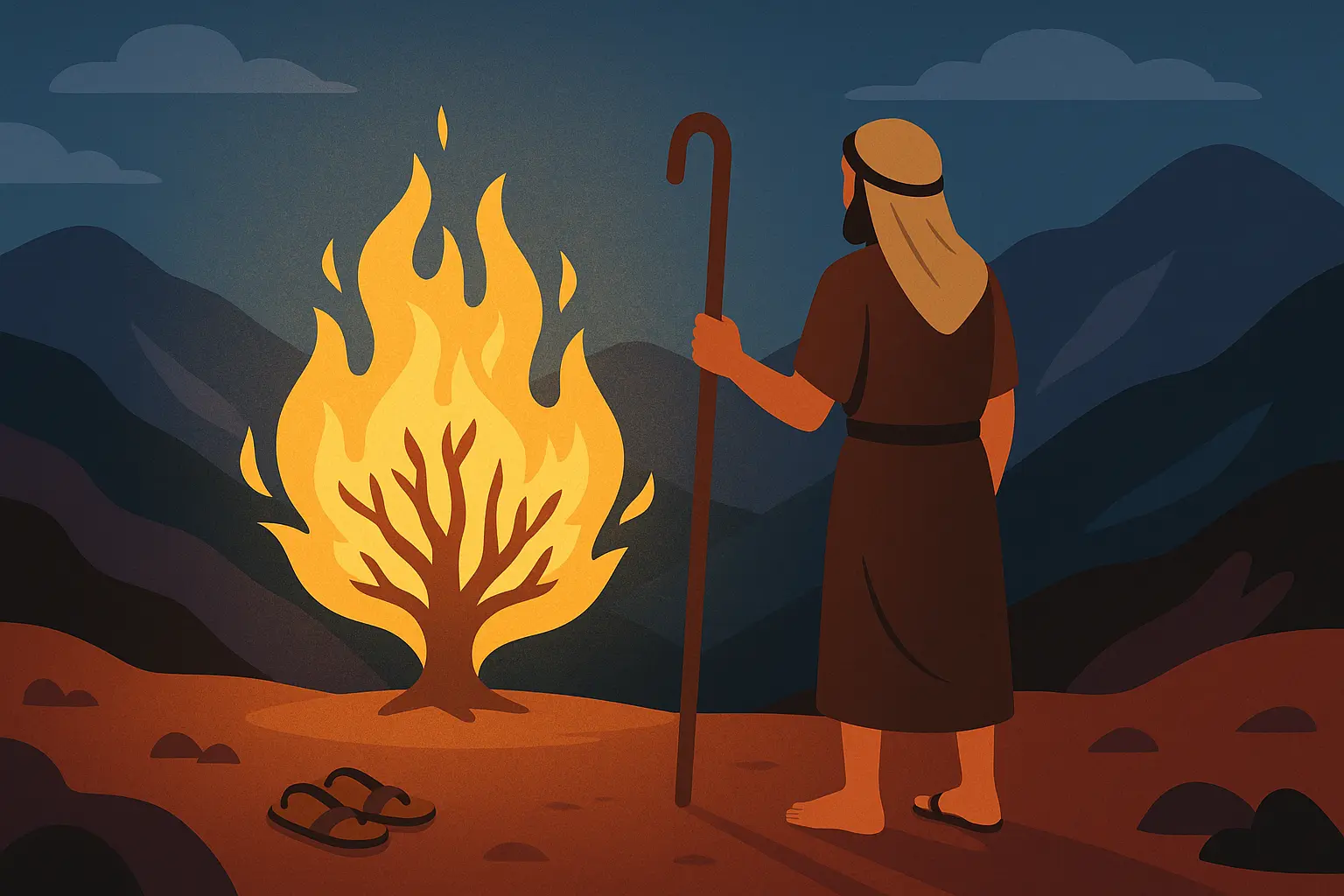
1. Moses and the Burning Bush
So Moses is out there doing the most boring job imaginable – watching sheep. Not exactly CEO material, right? Then he sees this bush that’s on fire but not burning up (which, let’s be honest, would freak any of us out), and suddenly he’s being asked to go toe-to-toe with the most powerful ruler in the world.
His response? “Who, me?” I mean, come on. We’ve all been there. That moment when someone asks you to do something way outside your comfort zone and you’re like, “I think you meant to call someone else.”
But here’s what I love about this story – God doesn’t say “You’re right, you’re not qualified.” He says “I’ll be with you.” Sometimes that’s all we need to hear. Not that we’re suddenly going to become perfect, but that we’re not doing it alone.
I think about my friend Sarah who got asked to run the PTA when she could barely keep her own kids’ schedules straight. She felt like Moses – totally unprepared. But you know what? She figured it out as she went, and the school had its best fundraising year ever.
2. Muhammad’s First Revelation
Picture this: you’re sitting alone in a cave, just thinking about life, and suddenly there’s this overwhelming presence telling you to read. Muhammad’s first reaction wasn’t “Oh cool, I’m a prophet now.” It was pure terror. He ran home to his wife basically saying “I think I’m losing my mind.”
And you know what Khadijah did? She didn’t call a therapist or tell him to get more sleep. She said “I believe you.” Sometimes that’s exactly what we need when life throws us a curveball – someone who believes in us even when we can’t believe in ourselves.
What strikes me is that this whole thing started with “Read.” Not “Perform miracles” or “Be perfect.” Just learn, grow, understand. That feels manageable, doesn’t it?
3. Abraham’s Call to Leave Ur
Okay, imagine God telling you to pack up everything, leave your hometown, your family, your job, and move somewhere He’ll show you later. No GPS coordinates, no job lined up, no housing arranged. Just “Trust me on this one.”
That’s basically what happened to Abraham. And somehow, he did it. I can barely commit to a new Netflix series without reading reviews first, and this guy packed up his entire life based on a promise.
I know a couple who felt called to adopt kids from foster care. They had to leave behind their comfortable two-bedroom condo, their savings account, and their quiet date nights. But they said yes to something bigger than their comfort zone. Five years later, they’ve got three kids and say it’s the hardest, best thing they’ve ever done.
4. Isaiah’s Temple Vision
Now Isaiah’s story is different – this guy actually volunteered. He sees this incredible vision of God’s glory, and instead of running away screaming (which would’ve been my response), he’s like “Pick me! Pick me!”
But even Isaiah needed that moment of purification first. The angel touched his lips with a coal from the altar because even eager volunteers need to be prepared for what they’re signing up for.
Sometimes I wonder if Isaiah would’ve been so eager if he knew he’d spend the next several decades delivering messages people didn’t want to hear. But maybe that’s the point – sometimes we need to say yes before we fully understand what we’re saying yes to.
5. Jeremiah’s Reluctant Calling
And then there’s Jeremiah, bless his heart. God calls him to be a prophet and his immediate response is “I’m too young!” Classic move – when we don’t want to do something, we focus on all the reasons we can’t.
But God’s response is perfect: “Don’t say you’re too young. I’ll give you the words.” It’s like when your boss assigns you a project you’ve never done before and you panic, but then you realize you can learn as you go.
Jeremiah’s honesty about his fears makes him so relatable. He didn’t pretend to be ready. He just admitted he was scared and let God work with that.
Stories of Faith Under Trial (5 Stories)
These are the stories that make you go “How did they not just give up?” Because let’s be real – when life hits hard, most of us want to crawl under the covers and pretend the world doesn’t exist.
But these stories don’t sugarcoat anything. They show people going through absolute hell and somehow finding a way to keep believing that things will work out. Not because they’re super-spiritual, but because sometimes faith is all you’ve got left.
6. Job’s Patience Through Suffering
Job’s story is brutal. Like, lose-everything-in-one-day brutal. His kids die, his business collapses, his health falls apart, and then his friends show up to basically tell him it’s all his fault.

Have you ever had one of those seasons where everything goes wrong at once? Your car breaks down the same week you get a huge medical bill and your relationship falls apart? That’s Job, except multiply it by a thousand.
What gets me is that Job doesn’t pretend to understand what’s happening. He doesn’t give his friends some spiritual-sounding explanation. He basically says “I have no idea why this is happening, but I’m not going to stop believing in God’s goodness.”
That’s not the kind of faith that makes sense on paper, but it’s the kind that gets you through when nothing else will.
7. Abraham’s Sacrifice of Isaac
This story messes with me every time I read it. God tells Abraham to sacrifice the son He promised him in the first place. Like, what kind of sense does that make?
But Abraham gets up early and starts the journey. Can you imagine that walk up the mountain? Isaac asking “Dad, where’s the lamb for the sacrifice?” and Abraham saying “God will provide” while his heart is breaking?
I think about parents who have to make impossible choices for their kids – like sending them to rehab or letting them face the consequences of their actions when every instinct says to rescue them. Sometimes love looks like letting go, even when it’s killing you.
8. Daniel in the Lion’s Den
Daniel knew exactly what would happen if he kept praying three times a day. It wasn’t like the law was a secret. But he decided that staying connected to God was more important than staying safe.
I mean, lions. Actual lions. And Daniel’s just like “Well, I guess this is how it goes.” That’s either incredible faith or he’d completely lost it. Maybe both.
The crazy part is that he survived, and the king who threw him in there ended up praising Daniel’s God. Sometimes our willingness to stick to our principles, even when it costs us, ends up influencing people we never expected.
9. Jonah and the Great Fish
Jonah tried to run away from what God asked him to do. Honestly, I respect that. At least he was honest about not wanting to do it instead of making excuses.
But running away just made everything worse. He ends up in the belly of a fish (which, let’s be honest, sounds like the worst Uber ride ever), and that’s where he finally decides to pray and get his head straight.
We’ve all had our “fish belly” moments – those rock-bottom times when we finally stop running and face what we need to face. Sometimes the worst situations become the places where we finally find clarity.
10. Noah’s Ark and the Flood
Noah spent years building a massive boat while his neighbors probably thought he’d lost his mind. No flood in sight, no previous experience with boat-building, just this conviction that he needed to prepare for something that had never happened before.
I think about people who make big life changes that don’t make sense to everyone else – like quitting a good job to start a nonprofit, or selling everything to care for aging parents. From the outside, it looks crazy. But sometimes you just know what you need to do.
|
Prophet |
What They Lost |
How They Responded |
What Happened Next |
|---|---|---|---|
|
Job |
Family, wealth, health |
Refused to blame God |
Got everything back and more |
|
Abraham |
Nearly lost his promised son |
Trusted God’s character |
God provided a substitute |
|
Daniel |
His freedom and safety |
Kept praying anyway |
Lions couldn’t hurt him |
|
Jonah |
His comfort and plans |
Finally obeyed (reluctantly) |
Entire city repented |
|
Noah |
His reputation and normalcy |
Built the ark anyway |
Saved his family and humanity |
Stories of Miraculous Intervention (4 Stories)
Okay, let’s talk about the elephant in the room. These miracle stories can be hard to swallow if you’re a facts-and-logic person. I get it. I used to skip right past them.
But here’s what I’ve learned – even if you can’t wrap your head around the supernatural stuff, these stories capture something true about those moments when help comes from nowhere and situations change in ways you never could have orchestrated.
11. Elijah and the Fire from Heaven
Elijah basically called out an entire religious system and said “Let’s settle this once and for all.” He set up this dramatic showdown on Mount Carmel – their gods versus his God, winner takes all.
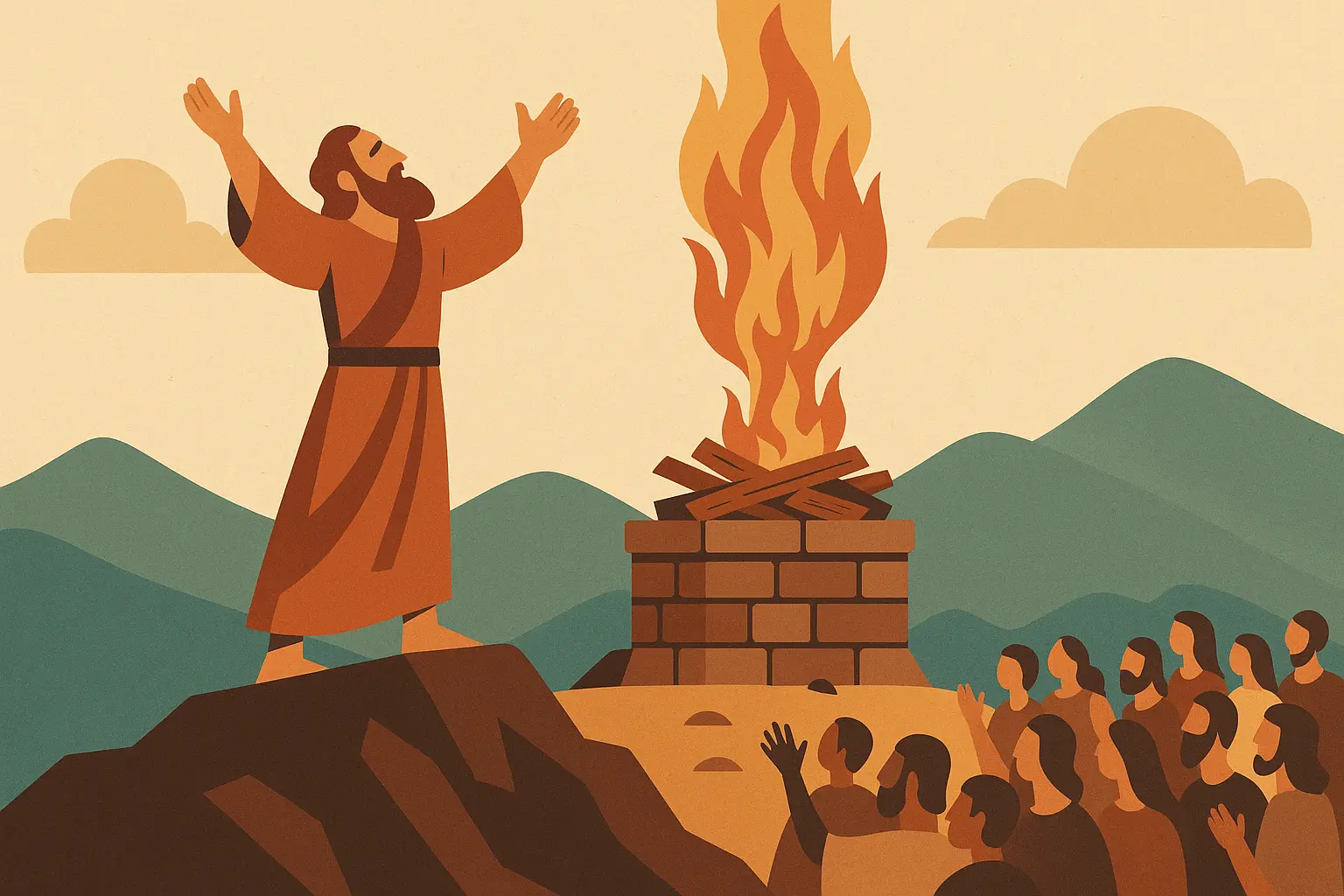
The confidence this took is insane. What if nothing happened? What if he just stood there looking like an idiot while everyone laughed? But Elijah was so sure about what he believed that he was willing to bet everything on it.
And then fire came down from heaven. The people fell on their faces and said “The Lord, He is God!” Sometimes the boldest stands lead to the biggest breakthroughs.
12. Moses Parting the Red Sea
The Israelites are trapped between the Egyptian army and the sea. Nowhere to run, nowhere to hide. Moses stretches out his hand and the sea parts. Just like that.
I think about times when I’ve been in impossible situations – like when my dad was in the ICU and the doctors said there was nothing more they could do. You’re standing there thinking “This is it. There’s no way out.” And then somehow, against all odds, a door opens that you never saw coming.
13. Jesus Feeding the Five Thousand
Five thousand people, five loaves, two fish. The math doesn’t work. The disciples are looking at this pathetic little lunch and basically saying “Jesus, this is ridiculous.”
But somehow , everyone ate until they were full, and there were twelve baskets of leftovers. It’s like when you’re planning a potluck and worried there won’t be enough food, but somehow everyone leaves stuffed and you’re sending people home with containers.
Sometimes what looks completely inadequate becomes more than enough when it’s offered with the right heart.
14. Elisha and the Widow’s Oil
This widow is about to lose her sons to slavery because she can’t pay her debts. All she has is a little jar of oil. Elisha tells her to borrow empty jars from her neighbors – as many as she can find.
The oil keeps flowing as long as there are jars to fill. When she runs out of containers, the oil stops. It’s like the miracle was limited only by her capacity to receive it.
Makes me think about opportunities I’ve missed because I didn’t prepare for success or didn’t believe something good could actually happen to me.
A modern parallel might be a single mother facing bankruptcy who starts a small home business with her last $50. Through unexpected referrals, viral social media attention, and doors opening at just the right moments, her business grows beyond anything she could have planned. The provision continues as she expands her capacity to receive it, demonstrating how small beginnings with faith can lead to miraculous multiplication.
Stories of Moral Courage and Justice (4 Stories)
These are the stories that make your palms sweat. Because speaking truth to power is terrifying, whether you’re confronting your boss about unethical practices or calling out a friend who’s making destructive choices.
But these stories show us that sometimes staying silent is more dangerous than speaking up.
15. Nathan Confronting King David
David had just committed adultery and murder, and somehow thought he’d gotten away with it. Nathan could have pretended not to notice or found a way to hint around the issue.
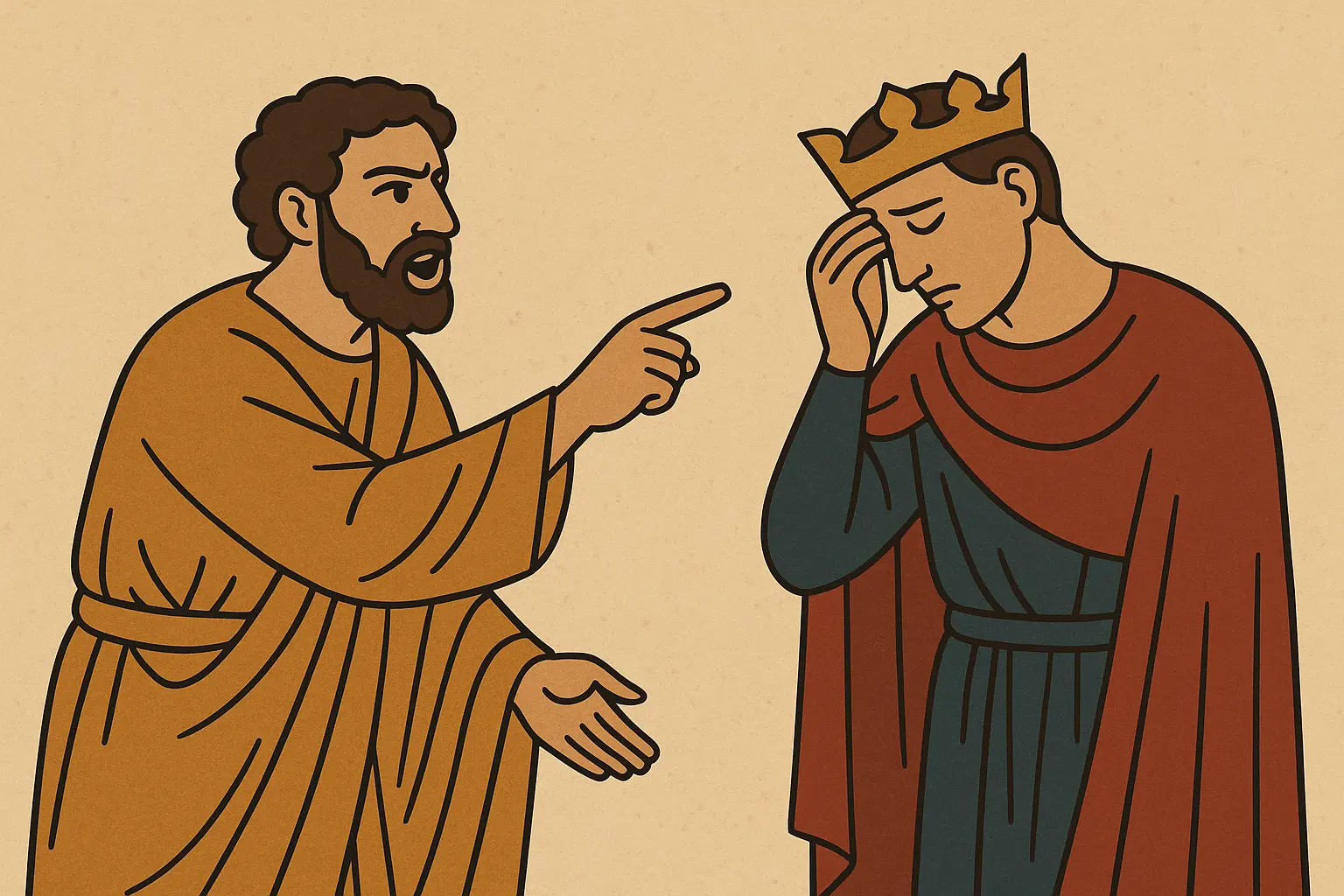
Instead, he told David a story about a rich man who stole a poor man’s lamb. David got furious and said the rich man deserved to die. Then Nathan dropped the bomb: “You are that man.”
The genius of Nathan’s approach was letting David condemn himself before revealing the truth. Sometimes the best way to help someone see their blind spots is to help them recognize the behavior in someone else first.
16. Amos Defending the Poor
Amos wasn’t even a professional prophet – he was a shepherd and a fig farmer. But he saw how the wealthy were exploiting the poor and couldn’t stay quiet about it.
He called out people who were “selling the righteous for silver and the poor for a pair of sandals.” These weren’t abstract social issues to him – he was talking about real people being crushed by greed.
Sometimes the people best positioned to speak truth are the ones who don’t have anything to lose – or who care more about justice than their own comfort.
17. John the Baptist Confronting Herod
John called out Herod for marrying his brother’s wife. This wasn’t a private moral failing – Herod was a public figure whose behavior influenced an entire region.
John knew this confrontation could cost him his life. And it did. But he decided that some things are more important than personal safety.
I think about whistleblowers who risk their careers to expose corruption, or people who speak up about abuse even when they know there will be consequences. That’s John the Baptist courage.
18. Ezekiel’s Watchman Ministry
God told Ezekiel he was like a watchman on a wall – if he saw danger coming and didn’t warn people, their blood would be on his hands. But if he warned them and they didn’t listen, he’d done his job.
That takes the pressure off in a weird way. Your job isn’t to make people listen or change their minds. Your job is to tell the truth and let them decide what to do with it.
Stories of Redemption and Forgiveness (4 Stories)
These are my favorite stories because they remind me that screwing up isn’t the end of the world. We all mess up. The question is what happens next.
19. The Prodigal Son (Jesus’ Parable)
The younger son basically told his dad “I wish you were dead” by asking for his inheritance early. Then he blew it all on parties and bad decisions.
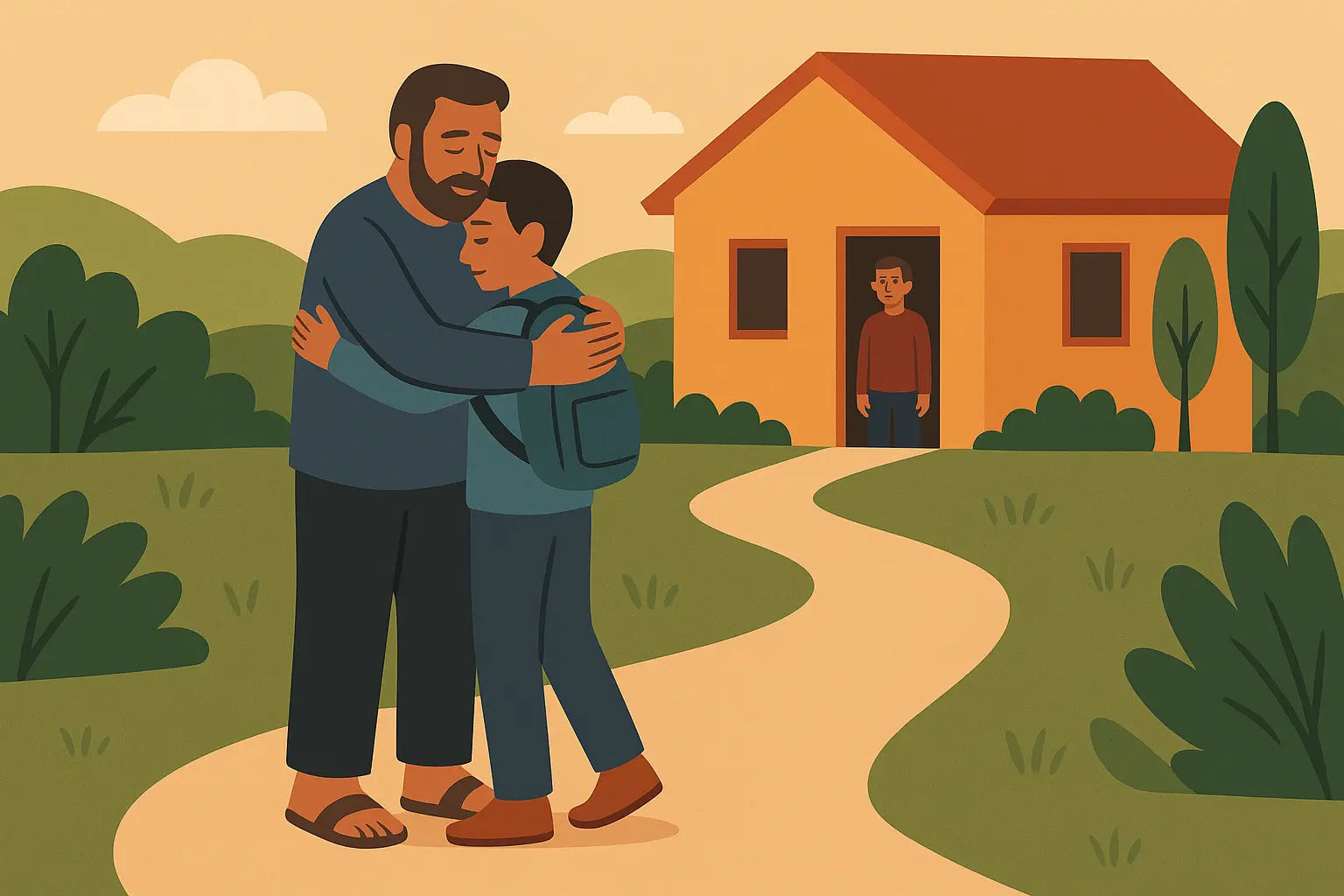
When he finally came home, expecting to be treated like a servant, his dad ran to meet him and threw a party. The older brother was furious – “I’ve been good this whole time and never got a party!”
This story wrecks me because I see myself in both sons. Sometimes I’m the screw-up who needs grace, sometimes I’m the “good kid” who resents it when other people get second chances.
20. David’s Repentance After Nathan’s Confrontation
After Nathan confronted David, David could have made excuses or blamed circumstances. Instead, he wrote Psalm 51 – one of the most honest prayers ever written.
“Create in me a clean heart, O God, and renew a right spirit within me.” No excuses, no minimizing, just “I messed up and I need help becoming the person I’m supposed to be.”
That’s the kind of apology that actually leads to change instead of just clearing the air.
21. Peter’s Restoration After Denial
Peter swore he’d never abandon Jesus, then denied even knowing him three times when things got dangerous. The guilt must have been crushing.
After the resurrection, Jesus asked Peter three times “Do you love me?” – one question for each denial. But instead of rubbing his failure in his face, Jesus was giving him a chance to affirm his love three times too.
Sometimes healing happens when we get to say the thing we wish we’d said the first time.
22. The Woman at the Well
This woman had been married five times and was living with someone she wasn’t married to. In her culture, that made her an outcast. She came to draw water in the middle of the day to avoid the other women who would whisper about her.
Jesus not only talked to her (which was shocking enough), but offered her “living water” that would satisfy her deepest thirst. Instead of condemning her past, he offered her a future.
She was so transformed by this encounter that she ran back to town and told everyone about Jesus. The woman who had been hiding became an evangelist.
Stories of Wisdom and Guidance (3 Stories)
These stories show what it looks like when spiritual insight meets practical problems. They’re not about mystical experiences – they’re about making smart decisions in real-world situations.
23. Solomon’s Request for Wisdom
God basically gave Solomon a blank check – “Ask for whatever you want.” Solomon could have asked for wealth, power, long life, or victory over his enemies.

Instead, he asked for wisdom to govern well. And God was so impressed that He gave Solomon wisdom plus all the stuff he didn’t ask for.
I think about job interviews where they ask “What’s your greatest weakness?” Most people try to spin a strength as a weakness. But what if we were honest about what we actually need to grow in?
24. Joseph’s Interpretation of Dreams
Joseph went from prisoner to prime minister because he could interpret Pharaoh’s dreams about seven years of plenty followed by seven years of famine.
But the real wisdom wasn’t just understanding what the dreams meant – it was having a practical plan for what to do about it. Store grain during the good years to prepare for the bad years. Basic, but brilliant.
Sometimes wisdom isn’t about having mystical insights. Sometimes it’s about seeing patterns and preparing for what’s coming.
25. Samuel’s Guidance of Israel
Samuel was one of those rare leaders who maintained integrity throughout his entire career. When he stepped down from leadership, he challenged the people to accuse him of any wrongdoing – taking bribes, playing favorites, abusing power.
Nobody could think of anything. That’s the kind of reputation you build over decades of consistent character.
But even Samuel had to adapt when the people demanded a king. He didn’t like it, but he helped them transition to a new form of government while continuing to provide wise counsel.
Sometimes wisdom means accepting changes you don’t prefer while still finding ways to contribute positively.
How These Ancient Stories Apply to Modern Life
Look, I’ll be honest – when I first started reading these stories, I thought “This is nice and all, but what does a guy living in a fish have to do with my mortgage payment?”
But then I started paying attention to the patterns. These aren’t stories about perfect people having mystical experiences. They’re stories about regular folks facing impossible situations and somehow finding the courage to keep going. Sound familiar?
These ancient narratives demonstrate storytelling principles that remain effective today, much like the techniques found in 25 short story examples that will transform your understanding of great fiction.

Leadership Lessons from Prophet Stories
Here’s the thing about leadership that nobody tells you in business school – most of the time, you’re making it up as you go along. You’re dealing with difficult people, making decisions with incomplete information, and trying to do the right thing when the right thing isn’t always clear.
These prophet stories are like a masterclass in leadership under pressure:
|
Leadership Challenge |
Prophet Example |
Modern Application |
|---|---|---|
|
Making unpopular but necessary decisions |
Samuel anointing kings reluctantly |
CEO implementing difficult restructuring for company survival |
|
Confronting unethical behavior |
Nathan confronting David |
Manager addressing workplace harassment |
|
Maintaining integrity under pressure |
Daniel continuing prayer despite decree |
Whistleblower reporting corporate fraud |
|
Serving others before self |
Joseph interpreting dreams to save Egypt |
Leader sacrificing personal gain for team success |
|
Admitting mistakes and seeking restoration |
David’s repentance after confrontation |
Executive taking responsibility for failed project |
Making Unpopular Decisions: Samuel had to anoint kings even though he thought it was a bad idea. Sometimes being a leader means doing what’s necessary instead of what’s popular. Like when my friend Jake had to lay off half his team to save the company – it sucked, but the alternative was everyone losing their jobs.
Confronting Problems: Nathan didn’t send David an anonymous note about his behavior. He looked him in the eye and told him the truth. Real leadership means having difficult conversations instead of hoping problems will fix themselves.
Admitting Mistakes: David didn’t make excuses when Nathan called him out. He owned it completely. I’ve seen leaders destroy their credibility by doubling down on bad decisions instead of just saying “I was wrong, here’s how we fix it.”
Staying True to Your Values: Daniel kept praying even when it was illegal. Sometimes doing the right thing costs you something, but compromising your integrity costs you everything.
Personal Growth and Character Development
The beautiful thing about these stories is that they show transformation is possible for anyone. Moses went from a guy with a speech impediment who was afraid of confrontation to leading millions of people out of slavery.
That’s not because he became perfect – it’s because he learned to trust that he wasn’t doing it alone.
I think about my sister who was terrified of public speaking but felt called to become a teacher. She started with tutoring one kid, then small groups, then eventually became department head at her school. Same person, but she grew into her calling one step at a time.
Consider someone struggling with public speaking who gets promoted to a role requiring presentations. They feel inadequate for the task, much like Moses saying “I am slow of speech.” However, by focusing on their message rather than their limitations, practicing consistently, and trusting that their purpose is greater than their fear, they can transform from reluctant speaker to confident communicator. The key is recognizing that divine calling often comes with divine empowerment to fulfill that calling.
Ethical Decision-Making in Complex Situations
Life is messy, and sometimes the “right” choice isn’t obvious. These stories don’t give you a rulebook, but they give you a framework for thinking through tough decisions:
-
What would love look like in this situation? (Even when it’s hard love, like confronting someone about destructive behavior)
-
What serves the greater good, not just my immediate comfort?
-
What choice will I be proud of when I look back in ten years?
-
What would I want someone to do if they were in my position?
Creating Your Own Inspiring Narratives
Here’s what I’ve learned from studying these stories: people don’t connect with perfection. They connect with struggle, growth, and hope.
Writers seeking to master narrative craft can benefit from studying these timeless examples alongside modern techniques for how to write a story using brain science behind effective storytelling.
The timeless appeal of prophet stories lies in their masterful combination of universal themes, compelling characters, and profound truths. These narratives have inspired countless writers throughout history because they demonstrate essential elements of powerful storytelling: clear motivation, escalating conflict, transformative moments, and meaningful resolution.
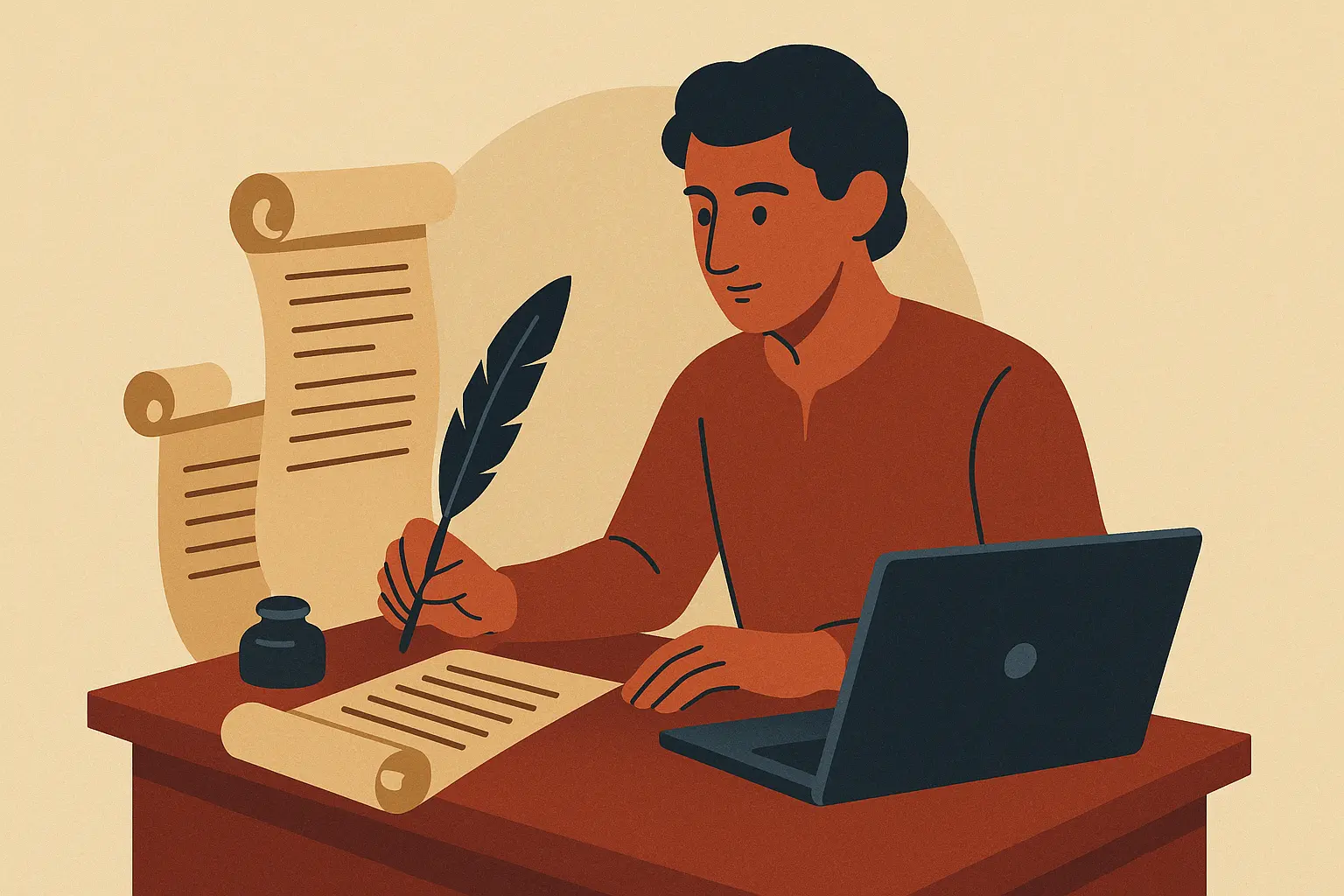
If you’re trying to tell your own story – whether it’s in a job interview, a blog post, or just explaining to your kids why you made certain choices – focus on the journey, not the destination.
Start with the struggle: Moses didn’t want to lead. Jonah ran away. Peter denied Jesus. The struggle is what makes them human.
Show the growth: How did they change? What did they learn? What would they do differently?
End with hope: Even when the story doesn’t have a perfect ending, what did it teach you? How did it prepare you for what came next?
The most powerful stories aren’t about people who had it all figured out. They’re about people who kept going even when they didn’t.
For modern content creators seeking to capture similar narrative power, understanding these classical storytelling principles proves invaluable. Prophet stories excel at balancing entertainment with deeper meaning, embedding profound truths within engaging plots that hold readers’ attention. This integration of theme and story provides a model for contemporary writers who want to create content that both engages and inspires.
Understanding these narrative structures can enhance your ability to craft compelling content, whether you’re exploring 25 folktale story examples that will transform your understanding of storytelling or developing original narratives.
Final Thoughts
I used to think these prophet stories were about superhuman people doing impossible things. Now I realize they’re about very human people discovering that they’re capable of more than they thought.
The guy who’s afraid to speak up in meetings can learn from Moses that feeling inadequate doesn’t disqualify you from leadership. The mom who’s struggling with a rebellious teenager can find hope in the prodigal son story. The person who’s made mistakes they can’t undo can see in David’s story that failure doesn’t have to be final.
These aren’t stories about people who never struggled. They’re stories about people who struggled and found something bigger than their struggle to hold onto.
Maybe that’s what makes them timeless. We’re all just trying to figure out how to be brave when we’re scared, how to do the right thing when it’s hard, and how to keep believing that things can get better even when everything feels impossible.
These stories remind us that we’re not the first people to face these challenges, and we won’t be the last. But somehow, people keep finding ways to rise above their circumstances and become more than they thought they could be.
And if they can do it, maybe we can too.



Add comment